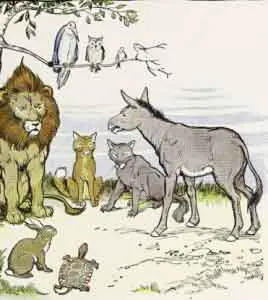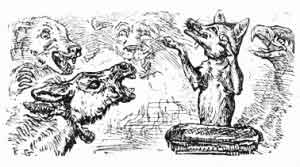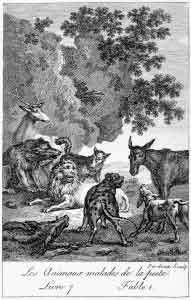The Beasts suffered a plague. A tribunal was to judge the most evil who would be sacrificed. The Ass, who did little wrong, was condemned and eaten. Ouch!
If you must be judged, make certain it’s before a fair judge.

Aesop For Children (The Animals and The Plague)
Once upon a time a severe plague raged among the animals. Many died, and those who lived were so ill, that they cared for neither food nor drink, and dragged themselves about listlessly. No longer could a fat young hen tempt Master Fox to dinner, nor a tender lamb rouse greedy Sir Wolf’s appetite.
At last the Lion decided to call a council. When all the animals were gathered together he arose and said:
“Dear friends, I believe the gods have sent this plague upon us as a punishment for our sins. Therefore, the most guilty one of us must be offered in sacrifice. Perhaps we may thus obtain forgiveness and cure for all.
“I will confess all my sins first. I admit that I have been very greedy and have devoured many sheep. They had done me no harm. I have eaten goats and bulls and stags. To tell the truth, I even ate up a shepherd now and then.
“Now, if I am the most guilty, I am ready to be sacrificed. But I think it best that each one confess his sins as I have done. Then we can decide in all justice who is the most guilty.”
“Your majesty,” said the Fox, “you are too good. Can it be a crime to eat sheep, such stupid mutton heads? No, no, your majesty. You have done them great honor by eating them up.
“And so far as shepherds are concerned, we all know they belong to that puny race that pretends to be our masters.”
All the animals applauded the Fox loudly. Then, though the Tiger, the Bear, the Wolf, and all the savage beasts recited the most wicked deeds, all were excused and made to appear very saint-like and innocent.
It was now the Ass’s turn to confess.
“I remember,” he said guiltily, “that one day as I was passing a field belonging to some priests, I was so tempted by the tender grass and my hunger, that I could not resist nibbling a bit of it. I had no right to do it, I admit—”
A great uproar among the beasts interrupted him. Here was the culprit who had brought misfortune on all of them! What a horrible crime it was to eat grass that belonged to someone else! It was enough to hang anyone for, much more an Ass.
Immediately they all fell upon him, the Wolf in the lead, and soon had made an end to him, sacrificing him to the gods then and there, and without the formality of an altar.
Moral
The weak are made to suffer for the misdeeds of the powerful.

JBR Collection
A mortal distemper once raged among the Beasts, and swept away prodigious numbers. After it had continued some time without abatement, it was concluded in an assembly of the brute creation to be a judgment inflicted upon them for their sins, and a day was appointed for a general confession; when it was agreed that he who appeared to be the greatest sinner should suffer death as an atonement for the rest. The Fox was appointed father confessor upon the occasion; and the Lion, with great generosity, condescended to be the first in making public confession. “For my part,” said he, “I must acknowledge I have been an enormous offender. I have killed many innocent sheep in my time; nay, once, but it was a case of necessity, I made a meal of the shepherd.” The Fox, with much gravity, owned that these in any other but the king, would have been inexpiable crimes; but that His Majesty had certainly a right to a few silly sheep; nay, and to the shepherd too, in case of necessity. The judgment of the Fox was applauded by all the superior savages; and the Tiger, the Leopard, the Bear, and the Wolf made confession of many enormities of the like sanguinary nature; which were all palliated and excused with the same lenity and mercy, and their crimes accounted so venial as scarce to deserve the name of offences. At last, a poor penitent Ass, with great contrition, acknowledged that once going through the parson’s meadow, being very hungry and tempted by the sweetness of the grass, he had cropped a little of it, not more however in quantity than the tip of his tongue; he was very sorry for the misdemeanour, and hoped– “Hope!” exclaimed the Fox, with singular zeal; “what canst thou hope for after the commission of so heinous a crime? What! eat the parson’s grass! Oh, sacrilege! This, this is the flagrant wickedness, my brethren, which has drawn the wrath of Heaven upon our heads, and this the notorious offender whose death must make atonement for all our transgressions.” So saying, he ordered his entrails for sacrifice, and the rest of the Beasts went to dinner upon his carcase.

de La Fontaine (Les Animaux malades de la peste)
[Note: a few letters in the book could not be read. They are replaced with asterisks here.]
Un mal qui répand la terreur,
Mal que le ciel en sa fureur
Inventa pour punir les crimes de la terre,
La peste (puisqu’il faut l’appeler par son nom ),
Capable d’enrichir en un jour l’Achéron,
Faisoit aux animaux la guerre.
Ils ne mouroient pas tous, mais tous étoient frappés:
On n’en voyoit point d’occupés
A chercher le soutien d’une mourante vie;
Nul mets n’excitoit leur envie;
Ni loups ni renards n’épioient
La douce et l’innocente proie;
Les tourterelles se fuyoient:
Plus d’amour, partant plus de joie.
Le lion tint conseil, et dit: Mes chers amis,
Je *vois que le ciel a permis
F**ur nos péchés cette infortune.
Que le plus coupable de nous
Se sacrifie aux traits du céleste courroux;
Peut-être il obtiendra la guérison commune.
L’histoire nous apprend qu’en de tels accidents
On fait de pareils dévoûments.
Ne nous flattons donc point; voyons sans indulgence
L’état de notre conscience.
Pour moi, satisfaisant mes appétits gloutons,
J’ai dévoré force moutons.
Que m’avoient-ils fait? nulle offense;
Même il m’est arrivé quelquefois de manger
Le berger.
Je me dévoûrai donc, s’il le faut; mais je pense
Qu’il est bon que chacun s’accuse ainsi que mof;
Car on doit souhaiter, selon toute justice,
Que le plus coupable périsse.
Sire, dit le renard, vous êtes trop bon roi;
Vos scrupules font voir trop de délicatesse.
Hé hien! manger moutons, canaille, sotte espèce,
Est-ce un péché? Non, non. Vous leur fîtes, seigneur,
En les croquant, beaucoup d’honneur;
Et quant au berger, l’on peut dire
Qu’il étoit digne de tous maux,
Etant de ces gens-là qui sur les animaux
Se font un chimérique empire.
Ainsi dit le renard; et flatteurs d’applaudir,
On n’osa trop approfondir
Du tigre, ni de l’ours, ni des autres puissances,
Les moins pardonnables offenses:
Tous les gens querelleurs, jusqu’aux simples mâtins,
Au dire de chacun, étoient de petits saints.
L’âne vint à son tour, et dit: J’ai souvenance
Qu’en un pré de moines passant,
La faim, l’occasion, l’herbe tendre, et, je pense,
Quelque diable aussi me poussant,
Je tondis de ce pré la largeur de ma langue:
Je n’en avois nui droit, puisqu’il faut parler net.
A ces mots on cria haro sur le baudet.
Un loup, quelque peu clerc, prouva par sa harangue
Qu’il falloit dévouer ce maudit animal,
Ce pelé, ce galeux, d’où venoit tout leur mal.
Sa peccadille fut jugée un cas pendable.
Manger l’herbe d’ autrui! quel crime abominable!
Rien que la mort n’étoit capable
D’expier son forfait. On le lui fit bien voir.
Selon que vous serez puissant ou misérable,
Les jugements de cour vous rendront blanc ou noir.


